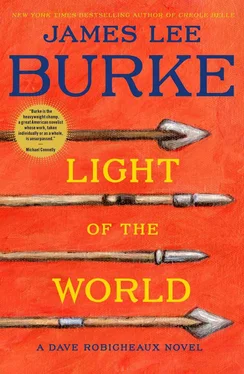Let me make a confession. I would like to say I became a police officer with the NOPD in order to make the world a better place. I became a cop in order to deal with a black lesion that had been growing on my brain, if not my soul, since I was a child. My parents embarked upon the worst course human beings are capable of: They destroyed their home and their family and finally themselves. If there is any greater form of loss, I do not know what it is. It stays with you every day of your life; you wake with it at dawn and carry it with you into your nocturnal hours. There is no respite or cure, and if your experience has been like mine, you have accepted that only death will separate you from the abiding sense of nothingness you wake with at the first touch of light on the horizon.
A man named Mack ruined my mother, and she helped turn my father, Big Aldous, into a sad, bewildered, raging alcoholic who once wrecked Antlers Pool Room and tore up seven Lafayette police officers with his bare fists. I had no feeling about the Vietcong or the NVA, but I put Mack’s face on every enemy soldier I killed. When I came back home, I rented an apartment in the French Quarter and slept with a .45 under my pillow, a round in the chamber, not in fear but in hope that someone would try to break in.
Please forgive my obsession. My own story isn’t important. The story of the human condition is. If you see your natal home destroyed, one of two things will happen: You will let the loss of your childhood continue to rob you of all happiness for the rest of your life, or you will build a family of your own, a good one, made up of people you truly love and in whose company you are genuinely happy. If you are unlucky, born under a dark star, violent men will ferret their way into the life of your family and re-create the act of theft that ruined your childhood. From that moment on, you will enter a landscape that only people who have stacked time in the Garden of Gethsemane will understand.
You will discover that the portrayal of law enforcement on television has nothing to do with reality. Chances are, you will be on your own. Perhaps you will find out that the suspected perpetrator has been released on bail without your being notified. The detective assigned to your case might do his best, but you will sense he is drowning in his workload and not always happy to see you. Your phone calls will go unanswered. You will become a nuisance and begin to talk incessantly about your personal problems, to strangers as well as friends. When you think it’s all over, you may receive a taunting call from the person who raped or murdered your loved one.
Sound like an exaggeration? Dial up someone who has been there and see what he has to say.
I remember sitting naked and ninety-proof in an Orleans Parish holding cell, flexing my hand, my body running with sweat, as I watched the veins swell in my forearm while I fantasized about a man I was going to kill as soon as I was released. The target of my anger was a Mafia boss I normally referred to as a three-hundred-pound load of whale shit whose name wasn’t worth remembering. I changed my mind when one of his gumballs shot my half brother, Jimmie, in the head and blinded him in one eye. That was when I decided to get back on that old-time lock-and-load rock and roll and turn a certain Mafia boss into wallpaper. At the time I thought and did these things, I was a police officer sworn to protect and serve.
Now I felt great shame at having doubted Alafair’s conviction about Asa Surrette surviving the wreck of the prison van. I felt I had not only let down my daughter, I had joined the ranks of deadbeat cops who turn a cynical ear to those who need and deserve help the most.
When we returned to Albert’s ranch from the mortuary, I made three calls to Kansas. The people there are among the best on earth, but bureaucracy is bureaucracy wherever you go. I’ve always suspected bureaucracy serves an ancillary purpose in the same way the human body absorbs an infection and prevents it from getting to the brain. Bureaucracy protects the people in charge from accountability. My efforts on the phone with the Kansas officials were beyond worthless. I was left with the impression that I had just conducted three separate conversations with a grain elevator.
I went out on the deck and sat on a chair in the sunshine, surrounded by huge pots of purple and blue and pink petunias, the wind ruffling the flowers. Molly came out and sat beside me. “Don’t let it get to you,” she said.
“Talking to people with CYBS?”
“What’s CYBS?”
“Cover-your-butt syndrome.”
“You think it’s Surrette?”
“It’s somebody who’s pure evil.”
“You think he killed Bill Pepper?”
“He didn’t just kill him.”
She waited for me to go on.
“You don’t want to hear the details, Molly. Whoever killed Pepper was a monster. Surrette may be one of the worst serial killers in American history. He’s cruel to the bone. I don’t want to tell you what he did to the children he murdered.”
“Don’t talk about it anymore.”
“I want to kill him.”
“You can’t carry around those kinds of thoughts. It’s like drinking poison.”
“It’s the way I feel. If he gets his hands on Alafair, she’s going to die a terrible death.”
“Stop it, Dave.”
I clenched my hands on my knees, stiffening my arms. In the distance, I could see Alafair’s Honda coming up the dirt road, driving faster than was her custom.
“Did you hear me?” Molly said.
“I’ve dealt with only one other man like Surrette. Remember Legion Guidry?”
“I remember what you said about him. When he was an overseer, he sexually abused black women in the fields.”
“What else did I say about him?”
“I disregarded that, Dave. I don’t believe we should think of our fellow human beings in those terms, no matter how bad they are.”
“I told you I thought he might be the devil. He had a smell about him like none I ever smelled on a human being.”
She got up from her chair. “I love you, but I won’t listen to this.”
I sat for what seemed a long time in the chair without moving. When Alafair turned under the arch into the driveway, I got up and walked down the steps and across the lawn to meet her. The back of my shirt was peppered with sweat in the wind, the flowers in Albert’s gardens bright with drops of water from the sprinklers. I wanted to gather Alafair in my arms and take her and Molly to a place ten thousand miles away, perhaps to an Edenic island on the Pacific Rim, like in the stories of Somerset Maugham and James Michener. But the canker in the rose is real, and Polynesian paradises long ago had been turned into cheap farms to supply the breadfruit fed to Caribbean slaves.
Alafair got out of the car and walked toward me, her fingers holding a sheet of lined yellow paper by one corner. “This was under my windshield wiper when I came out of the post office,” she said.
I got my handkerchief from my pocket and took the paper from her and read it. The message had been hand-printed with a felt-tip pen, each of the letters like a block or a cube, as stiff and linear as a hieroglyph. I could hear the wind coursing through the maples and the ornamental crab apple. Molly had followed me down from the deck and was looking over my shoulder. “What is it?” she said.
“Read it,” I replied, holding the letter by the corners.
“I don’t need to. Just tell me what it is,” she said.
“Read it,” I repeated.
Her eyes followed one line into the next, the blood draining from around her mouth.
“Where are you going?” I said.
“To get that goddamn do-nothing sheriff on the telephone,” she said.
I wanted to laugh or at least to smile to take the tension and angst out of the moment. But humor was not an option. That’s the hold evil has upon us. There is nothing funny about the kind of evil represented by men like Asa Surrette or Legion Guidry. Charlie Manson was funny because he was so inept and cowardly, he had to use a collection of mindless vegetables to carry out his crimes. I was becoming convinced that creatures like Asa Surrette and my old antagonist Legion did not have human origins. They came from somewhere else. Where? you ask. I didn’t want to think about the possibilities.
Читать дальше












